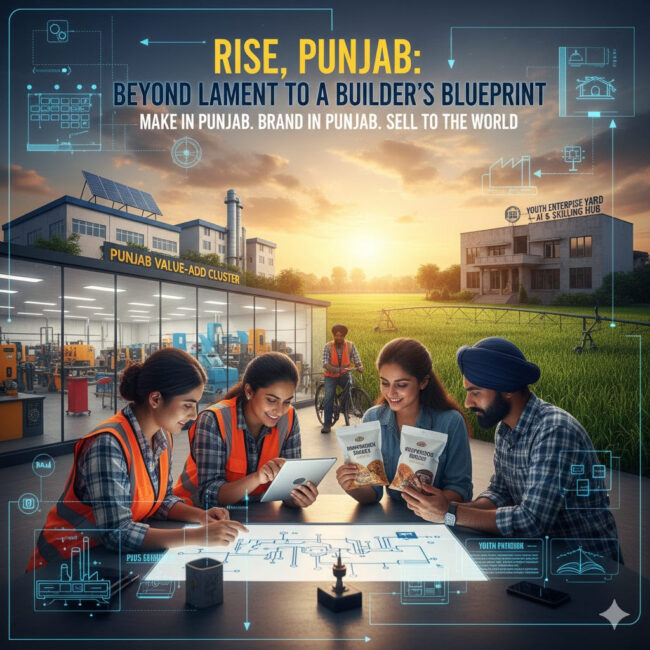 Sardar Ramesh Inder Singh’s column in The Hindustan Times today is both honest in tone and earnest in intent. It articulates the unease many Punjabis feel: an economy stuck in low gear, a politics addicted to acrimony and short-termism, and a generation increasingly tempted to leave. The reputed former Chief Secretary of Punjab is right that agriculture—our historic backbone—now bears the weight of diminishing returns, ecological stress, and mounting indebtedness among farm households. He is right, too, that the violence and trauma of the 1980s cast a long shadow over investment and administration, and that a culture of road and rail blockades, gangsterism, and unresolved flashpoints continues to corrode confidence. The fiscal picture he sketches—thin capital formation and thickening debt—rings true. So does his portrayal of the demographic squeeze: below-replacement fertility, outward migration of the working-age population, and a growing share of elderly citizens.
Sardar Ramesh Inder Singh’s column in The Hindustan Times today is both honest in tone and earnest in intent. It articulates the unease many Punjabis feel: an economy stuck in low gear, a politics addicted to acrimony and short-termism, and a generation increasingly tempted to leave. The reputed former Chief Secretary of Punjab is right that agriculture—our historic backbone—now bears the weight of diminishing returns, ecological stress, and mounting indebtedness among farm households. He is right, too, that the violence and trauma of the 1980s cast a long shadow over investment and administration, and that a culture of road and rail blockades, gangsterism, and unresolved flashpoints continues to corrode confidence. The fiscal picture he sketches—thin capital formation and thickening debt—rings true. So does his portrayal of the demographic squeeze: below-replacement fertility, outward migration of the working-age population, and a growing share of elderly citizens.
He also identifies why the knowledge wave passed us by in the 1990s: a late start, weak human-capital pipelines, and leadership aligned almost exclusively with agrarian priorities. His remedies—diversify beyond agriculture, reform farming with allied activities and skilling, execute the stack of existing vision documents, and replace the politics of freebies with citizen-driven course correction—are sensible. They would stabilise the patient.
Yet stabilisation is not resurrection. Where the piece underplays the path forward is in the nuts and bolts of how Punjab builds value where it already has muscle, who leads that build, and how the State gets out of the way without walking off the field. The future belongs not only to deep-tech campuses and global IT parks (we should welcome them), but also to thousands of medium and small value-adding firms, youth-led cooperatives, and practical, revenue-first start-ups—more “build-and-sell” than “pitch-and-burn”.
From commodity to value: make in Punjab, brand in Punjab, sell to the world
The fastest engine we can ignite is value addition around our existing strengths. That means a pivot from growing to making and branding:
Agro-processing 2.0: Ready-to-eat and functional foods (low-GI atta, high-protein snacks, cold-pressed oils), aseptic packaging, nutraceuticals from kinnow peels and oilseeds, and export-grade spice and pulse blends. Build district-level shared facilities—testing labs, cold chains, packaging units—so micro-enterprises don’t bear lumpy capex alone.
Precision light manufacturing: Machine tools, farm implements, bicycle and auto components, sports-tech gear, medical disposables. Build cluster-based vendor parks with shared tool rooms, quality labs and a pooled export desk that handles certifications, logistics aggregation and buyer discovery.

Textiles-to-apparel upgrade: Move from yarn and fabric into technical textiles, performance wear, and private-label manufacturing for global D2C brands, leveraging our design schools and diaspora retail links.
Green devices and retrofits: Solar racking, agri-pumps, low-cost heat pumps, EV retrofitting kits for two- and three-wheelers—areas where MSMEs can scale quickly with standardised components.
The principle is simple: push every tonne of Punjab’s output one or two notches up the value chain. Profit pools grow, jobs deepen, and the tax base broadens—without waiting for unicorns.
Start-ups that fit our streets, not just our slides
We should stop imagining “start-up” as code for lab research and venture capital alone. Punjab’s next wave can be street-smart entrepreneurship by small teams that stitch tech-light workflows onto real local demand:
Services with process discipline: Facility management, logistics aggregation for kirana and mandis, last-mile warehousing, healthcare logistics, repair/refurbish marketplaces, and rural BPOs that run on standard operating procedures, modest software and relentless customer service.
Co-op start-ups: Youth dairy and poultry collectives with shared chilling/feed procurement; artisan and jutti clusters with pooled design, branding and e-commerce; mandi-adjacent cleaning, grading and packaging units jointly financed and professionally managed.
Procurement-anchored ventures: The State’s role is to buy smart, not build factories—commit multi-year procurement (with price discovery and quality thresholds) for school nutrition, hospital supplies, public works uniforms, horticulture seedlings, and maintenance contracts. A predictable order book crowds in bank credit and lets founders hire and train.
To catalyse this, create Youth Enterprise Yards in every district: low-rent bays with power, water and compliance help; a common services centre for accounts, HR, GST and export paperwork; and a small “Try, Pivot, Close” grant that rewards timely exits as much as success—because learning cycles build founders.
A facilitation-first State
Facilitation is not a slogan; it is a check-list with deadlines:
Plug-and-play sites: Pre-approved, litigation-free industrial and enterprise zones with utilities on day one, standard leases, and a single digital agreement.
Time-boxed approvals: If the department misses the service-level agreement, the licence is deemed approved, and the officer must record reasons for delay.
Fast commercial justice: Evening commercial courts and small-cause benches for sub-₹50 lakh disputes; e-filing, e-summons, and summary judgments for contract enforcement.
Transparent, rule-based incentives: Front-loaded for micro and small units, tied to jobs created and GST paid, with automatic disbursal.
Clean law-and-order lines: Ban “permissionless protest” that blocks roads/rails; designate protest sites; make extortion and illegal arms cases non-compoundable; protect whistle-blowers.
Diaspora: from donor to deal-maker
Punjab’s diaspora can do more than send funds or build halls. We need their markets, methods and mentorship:
Punjab Diaspora Angel Grid: A regulated platform where diaspora invests ticket sizes of ₹10–50 lakh into vetted MSMEs and youth ventures, with risk-sharing by a State-backed first-loss pool.
Market access compacts: City-level agreements—Surrey, Southall, Brampton—where chambers and gurdwara committees help list Punjabi brands in retail, run pop-up fairs, and secure private-label contracts.
Returnee Fellowships: Two-year “Build in Punjab” fellowships for professionals abroad (operations, quality, digital marketing) to embed in clusters and transfer process capability.
AI for everyone, not just the few
Artificial intelligence is a lever for small enterprises and farms:
AI-assisted agronomy in Punjabi: Voice bots that give seed/soil/water advice; pest alerts from satellite and phone images; and price forecasts for sowing decisions.
MSME productivity tools: Off-the-shelf AI for inventory, demand prediction, route planning, and quality inspection via smartphone cameras. Create a Punjab AI Exchange to curate safe, low-cost tools and provide data-privacy templates.
Governance analytics: Real-time dashboards for groundwater extraction, crop diversification uptake, drug-de-addiction follow-ups, and procurement transparency—publishing ward-level outcomes that citizens can audit.
Skills at scale: Micro-credential courses (8–12 weeks) delivered at ITIs and polytechnics: “AI for supervisors”, “No-code apps for small businesses”, “Data entry to data quality”, each ending with a paid apprenticeship.
Stem outward migration by making staying valuable
Youth will stay when staying pays—in dignity and rupees. That means relevant education and paid experience:
Dual track skilling: Align ITIs and polytechnics with cluster needs; require every final-year student to complete 600 paid apprenticeship hours; tie institute funding to graduate earnings 12 months out.
Credit for competence: Let banks lend against apprenticeship records and purchase orders, not only land; expand CGTMSE-style guarantees so first-time founders can borrow modestly without family collateral.
Local pride, global pathways: Not everyone must stay. Offer “Punjab Abroad, Punjab at Home”: portability schemes where a youth who works three years abroad gets fast-track support to return and start a unit, carrying orders and methods back.
Water, soil, and health: the non-negotiables
Economic resurrection collapses without ecological repair and healthier communities:
Water discipline with incentives: Metered electricity for large tubewells with a lifeline slab; cash-back for water-saving; rapid shift to short-duration paddy, maize, and pulses where viable; micro-irrigation as infrastructure, not a scheme.
Drug-use response that works: Community-centred, evidence-based de-addiction with job guarantees attached to completion; strict policing of supply chains; and measurable targets published quarterly.
Devolve for delivery: Panchayati Raj that actually decides and spends
A deep revival is impossible from Chandigarh alone. Push power and money down:
True devolution: Transfer the 29 subjects meaningfully—along with functionaries and funds—to Panchayats and Urban Local Bodies. Publish a Devolution Dashboard so citizens can see what moved.
Formula-based grants: Share state taxes transparently with PRIs; allow them to raise modest local cesses for waste, water and street lighting, matched rupee-for-rupee by the State upon meeting service standards.
District Plans with teeth: Revive District Planning Committees led by professionals (not only politicians), integrating agriculture, MSMEs, skilling, health, and water under one rolling three-year plan with public hearings.
When village councils hire local youth for waste management, water maintenance, anganwadi upgrades and last-mile health outreach—with proper training and performance pay—we create jobs that serve, reduce leakage, and build civic muscle. Local government then becomes the nursery of both entrepreneurs and accountable leaders.
From grievance to grit
Punjab has always been at its best when adversity forced ingenuity. Today’s adversity is quieter but no less serious: value lost in commodity traps, confidence eroded by unpredictability, young energy flowing out. The counter-thesis to a dole-driven, mega-project mirage is a builder’s commonwealth: a facilitation-first State; value-adding clusters; practical start-ups; diaspora as deal-makers; AI as a productivity tool for the many; skills that match real work; and village councils trusted to decide and deliver.
Stability is the floor. Dignified, widely shared prosperity is the goal. Let’s move from diagnosing Punjab to constructing Punjab—one unit, one cluster, one Panchayat at a time.